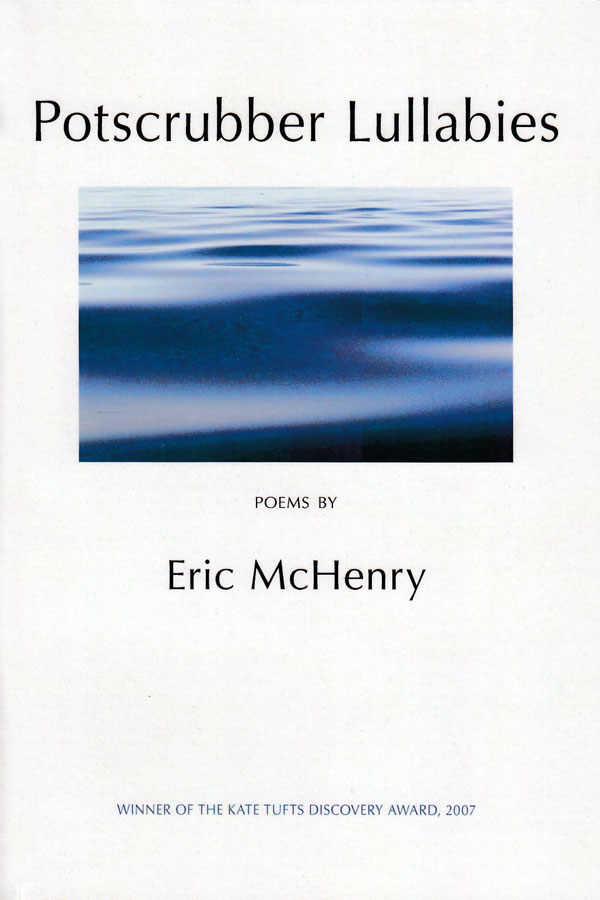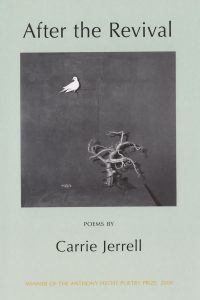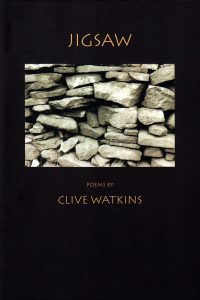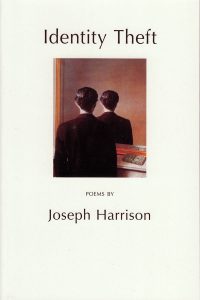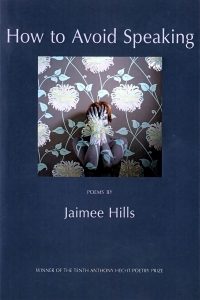Potscrubber Lullabies
£7.95
Potscrubber Lullabies aren't the kind that will put you to sleep. The poems in this first collection dance, dart, and double-cross, and are deadly serious the whole time. Preoccupied with impermanence and injustice, Eric McHenry wagers everything on the redemptive power of music, irony, and love. His language can be extraordinarily playful and self-aware – the double-negative "affirms / itself in no uncertain terms"; the census strains "the dead / from decade"; and a neighborhood blighted by Dutch Elm Disease learns that when "You take the elms from Elmhurst, you get hurt". But the poems always remain rooted in the sentence-rhythms of spoken English – in plain speech and "the plain fact of song"
Winner of the Kate Tufts Discovery Award, 2007
Out of stock
Potscrubber Lullabies
"Every one of these poems is a little miracle of self-exactitude, rhyming and word play and metrical joy; they’re games the words in the poem play elatedly with each other, and everybody wins. The poems are victories of observation and self-observation, outsight and insight. I think there’s genius in this writing." – David Ferry
"This is a book that combines themes, places and music with wit and feeling, while letting them be what they are. Full of people, landscape and language treated with subdued newness. A great first book." – Aaron Fogel
"The exuberant, acrobatic poems of Potscrubber Lullabies are full of music and awareness of music. Along with their virtuosity, they have genuine feeling: generous laughter; a sneaky dignity free of self-importance; curiosity about the world; and an admirable sense of balance." – Robert Pinsky
"Eric McHenry’s Potscrubber Lullabies is a fabulous book, one of the best books I’ve read in years. Witty, poignant, offbeat, elegiac and satirical (sometimes all at once), with metrical subtlety and sly rhymes McHenry explores the idiom of place and the place of idiom. He reveals how even the most personal and intimate utterances lean ‘hard with the weight of someone else’s meaning.’ This debut collection marks the beginning of a new and significant voice in American poetry." – Alan Shapiro
"Potscrubber Lullabies is a funky, tough-minded, grown-up first book of poems, dangerously deadpan and winsome, as alert to large social realities like Midwestern floods and politics as to tiny motions of the soul. McHenry’s wordplay, a marriage of zany wit and truthfulness, never misses the beat or the point. Whether he is slinging his troubleball as John the Revelator, or declaring ominously, ‘When you say nothing I know what you mean,’ he has our number, and we have reason to be grateful." – Rosanna Warren
Book of the Year Nominations
Kansas City Star, November 19th 2006
"[Potscrubber Lullabies] deftly balances the cerebral and the accessible."
Reviews of Potscrubber Lullabies
Virginia Quarterly Review,February 2007
“Ambrose Bierce drew national boundaries between humor and wit: ‘Nearly all Americans are humorous; if any are born witty, Heaven help them to emigrate.’ British publisher Waywiser Press accepts (for publication anyway) émigrés of the poor climate in this country for wit-wrought metrical poetry and they have preserved a rare specimen of American cleverness in selecting Potscrubber Lullabies …
[This book] has many of the same elements as much more blah collections – strolled towns and graveyards, a kitchen window, a compost pile and wheelbarrow, a family, the eponymous Potscrubber dishwasher – but these poems do what many don’t: they are intent on and successful at leaving these scenes more memorable for the careful linguistic inspection. Normally suspicious when I hear the drumbeat of traditional forms, here I’m tempted to salute. Don’t let a few colorfully borrowed bars fool you: by the dawn’s early light, there’s something very American up at Ft. McHenry." – Kevin McFadden
Cranky, August 2006
“McHenry’s poems … range in content from familial issues to politics to pop culture to self-reflection. The themes are often familiar or funny, but always emotionally brightened by McHenry’s aural strategies: word-play, rhyme, meter and repetition. McHenry obviously delights in language … but his delight brings with it a serious outcome. Robert Frost claimed that poetry is ‘play for mortal stakes.’ Eric McHenry plays well, and touchingly." – Amy Schrader
Bostonia, Fall 2006
McHenry … muses serenely and often on “temporariness, the big unfairness”; left to nature’s whims, even grave sites and gravestones, the most permanent memorial most of us can hope for, shift (“I love this cemetery’s / asymmetries, although / it must be hell to mow”). Engaging observations are lit by straight-faced puns, off-rhymes, inventive metrics, and nonintuitive rhyme schemes, with their often-delayed jabs of humor.
If you would like to hear Eric reading a poem from Potscrubber Lullabies ("The Incumbent"), click on the link below, which will take you to Slate magazine, where it is featured as poem of the week [for the week commencing June 20th 2006].
Poem from Potscrubber Lullabies by Eric McHenry
Potscrubber Lullabies
I
The Potscrubber completes a cycle
so vigorous the knives were rattling,
and pauses, waking Evan Michael,
who finds all silences unsettling.
There’s no resemblance. It’s too early.
Everything is still so round.
But we’ve occurred to him as surely
as silence has occurred to sound,
and when he’s finished sharpening
into himself, and when we’ve blurred,
we’re going to go on happening
in silence like he’s never heard.
II
I wore him like a broken arm
all summer, slung
from my right shoulder in a paisley hammock
so deep the sides closed over him.
When I walked he swung, and slept,
lulled by the time his body kept
against my stomach.
When I stopped I had to sing.
The Waywiser Press
Bird Plays to a Cow
A Swedish musician remembers a drive through farm country in a car full of musicians, one of whom told Bird that cows love music. Bird asked the driver to pull over …” – Gary Giddins, Celebrating Bird: The Triumph of Charlie Parker
Fifty years from now
a writer, writing about me
playing to this cow,
will call the cow “he.”
There’s her udder, plain
as an udder, and yet . . .
something about what people want
a cow, or an audience, to be.
Some painters haze the foreground
and render something in the middle-distance
unnaturally sharp, to remind the idiot looker
that this is a painting, not a pasture.
The writer will probably do
something self-referential, too,
and will almost certainly call the cow “bewildered.”
“Bewildered.” As though
I strode out here expecting her to nod
in time or stand on two hooves and applaud.
As though cows stand around waiting for something,
and not just anything, to come along.
Come on. What I do might confuse
you, but this cow was wildered when I got here.
To this cow there is only the plain fact –
hot fence, sharp fence, shit,
puddle, tuft of grass, golden horn
in the hands of the brown man
who wasn’t here this morning and is here now,
and notes, too –
after so much noise,
the plain fact of song.
My friend,
the bewildered one who’s still in the car,
told me that cows dig music.
I choose to believe that. That’s what I’m doing here.
She chews. That’s what she’s doing here.
The Waywiser Press
Excerpts
Potscrubber Lullabies
I
The Potscrubber completes a cycle
so vigorous the knives were rattling,
and pauses, waking Evan Michael,
who finds all silences unsettling.
There’s no resemblance. It’s too early.
Everything is still so round.
But we’ve occurred to him as surely
as silence has occurred to sound,
and when he’s finished sharpening
into himself, and when we’ve blurred,
we’re going to go on happening
in silence like he’s never heard.
II
I wore him like a broken arm
all summer, slung
from my right shoulder in a paisley hammock
so deep the sides closed over him.
When I walked he swung, and slept,
lulled by the time his body kept
against my stomach.
When I stopped I had to sing.
The Waywiser Press
Bird Plays to a Cow
A Swedish musician remembers a drive through farm country in a car full of musicians, one of whom told Bird that cows love music. Bird asked the driver to pull over ...” – Gary Giddins, Celebrating Bird: The Triumph of Charlie Parker
Fifty years from now
a writer, writing about me
playing to this cow,
will call the cow “he.”
There’s her udder, plain
as an udder, and yet . . .
something about what people want
a cow, or an audience, to be.
Some painters haze the foreground
and render something in the middle-distance
unnaturally sharp, to remind the idiot looker
that this is a painting, not a pasture.
The writer will probably do
something self-referential, too,
and will almost certainly call the cow “bewildered.”
“Bewildered.” As though
I strode out here expecting her to nod
in time or stand on two hooves and applaud.
As though cows stand around waiting for something,
and not just anything, to come along.
Come on. What I do might confuse
you, but this cow was wildered when I got here.
To this cow there is only the plain fact –
hot fence, sharp fence, shit,
puddle, tuft of grass, golden horn
in the hands of the brown man
who wasn’t here this morning and is here now,
and notes, too –
after so much noise,
the plain fact of song.
My friend,
the bewildered one who’s still in the car,
told me that cows dig music.
I choose to believe that. That’s what I’m doing here.
She chews. That’s what she’s doing here.
The Waywiser Press

